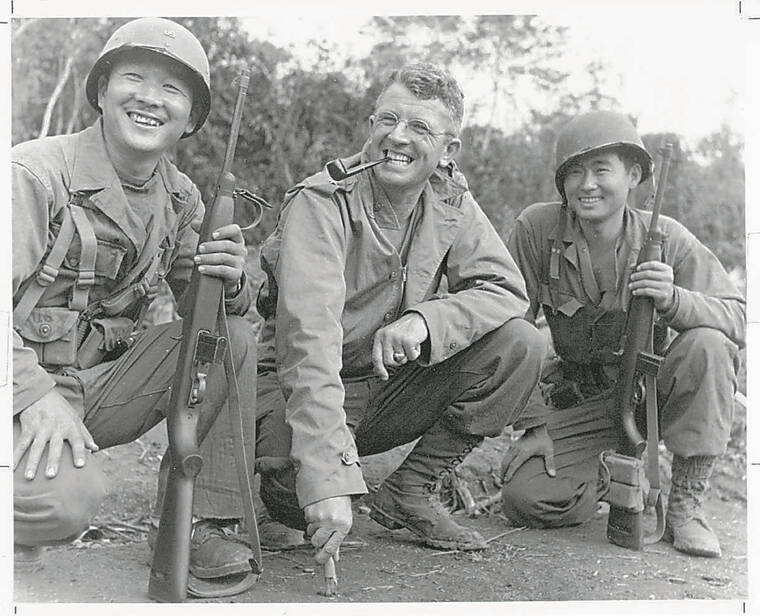The Japanese government has officially recognized three organizations in Hawaii for their efforts in preserving the history of Nisei veterans and fostering goodwill between Japan and the United States. Announced by the Japanese Ministry of Foreign Affairs, the Foreign Minister’s Commendations were awarded to the 100th Infantry Battalion Veterans, the 442nd Legacy Center, and the Military Intelligence Service Veterans of Hawaii. This recognition comes 80 years after the conclusion of World War II.
The announcement was made last week, with Yoshinori Kodama, the Japanese Consul General in Hawaii, nominating the groups. A ceremony to present the awards is expected to take place later this year. According to a news release from the Japanese consulate in Honolulu, these organizations have significantly contributed to the understanding of Japanese American history in the United States. They have worked towards improving the status of Japanese Americans and enhancing friendly relations between Japan and Hawaii, and by extension, between Japan and the United States.
Kathi Hayashi, president and education chair of the 100th Infantry Battalion Veterans, expressed the importance of the commendation. She stated, “This is very significant to us because it honors 80 years of work by our members to foster healing, promote peace, and collaborate towards mutual understanding and aloha between Japan and the United States.”
The legacy of Nisei veterans is deeply intertwined with the history of World War II. Following the surprise attack on Pearl Harbor on December 7, 1941, Japanese Americans faced intense scrutiny and persecution. Many were classified as “enemy aliens,” resulting in thousands being interned in camps. Despite this, numerous Nisei—U.S.-born, second-generation Japanese Americans—chose to serve in the military, fighting bravely against German and Italian forces in Europe and supporting intelligence operations in Asia and the Pacific.
The 100th Infantry Battalion was formed primarily from former members of the Hawaii National Guard who were segregated into a unit due to doubts about their loyalty. This battalion, known informally as the “One-Puka-Puka,” saw significant action in Italy, gaining recognition for its bravery. Hayashi noted that media coverage soon led to the soldiers being dubbed the “Purple Heart Battalion” for their courage and sacrifices.
As the battalion’s reputation grew, it paved the way for the formation of the 442nd Infantry Regiment, which combined Nisei troops from both Hawaii and the mainland. This regiment would become the most highly decorated combat unit in U.S. Army history, having achieved numerous accolades for its bravery and effectiveness in battle.
In parallel, the Military Intelligence Service began enlisting Nisei soldiers for their skills in interpreting enemy communications and conducting interrogations, despite some initial resistance from military leaders. These individuals often operated in elite units behind enemy lines, gathering critical intelligence. After the war, Japanese American MIS veterans played a vital role in the U.S. occupation of Japan, aiding in the country’s transition to democracy.
Following their military service, veterans of the 442nd engaged in post-war reconciliation efforts, fundraising to support war-affected communities in Japan. Over the decades, these veterans have been instrumental in shaping the relationship between the United States and Japan as the two nations transitioned from adversaries to allies.
Today, only a few veterans from these significant military units remain. However, their families are actively involved in ensuring their stories and legacies endure. Hayashi emphasized the ongoing commitment to peace and understanding, stating, “This commendation means so much, and we feel even more passionate to work together towards peace and understanding.”
This recognition comes at a time when discussions around military history and representation have gained renewed attention. Earlier this year, under the new Trump administration, the Army removed certain online content related to Nisei veterans as part of a broader initiative aimed at a “digital refresh.” This move sparked significant backlash in Hawaii from local leaders and veterans’ organizations.
In response, Army Secretary Dan Driscoll later acknowledged that some decisions made during this process were not intended. He emphasized the importance of having a military that reflects diverse cultural knowledge, particularly in regions like Asia and the Pacific. Driscoll stated, “You want a variety of experiences, backgrounds, and talents to be mixed together,” highlighting the necessity of embracing diversity as a strength.
As Japan honors these organizations, the contributions of Nisei veterans continue to resonate, reminding us of the complexities of history and the enduring spirit of reconciliation and understanding between nations.
